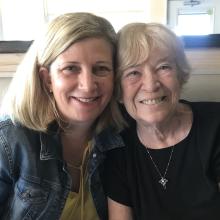Mentorship Matters

As a high school student in the 1980s, Anne D’Angelo developed a close relationship with her French teacher. Throughout the years, D’Angelo often sought advice from her beloved teacher, Michele Hubley, who died last December.
In the months before graduating from college in 1989, D’Angelo contacted Hubley about a decision that she had to make: accept a job offer from an insurance company or enroll in the Japan Exchange and Teaching (JET) Program.
Hubley, who was living in Tokyo with her family at the time, encouraged her former student to accept the “once-in-a-lifetime opportunity” to spend time abroad and learn a new language.
“Michele, in collaboration with my mother, encouraged me to take the opportunity to try something new and to differentiate myself from others,” says D’Angelo, assistant dean of global initiatives for the University of Minnesota’s Carlson School of Management. “She also knew it would open my eyes to the much wider world out there, including potential opportunities for me.”
“Sometimes having a special teacher believe in you, see you, and encourage you—it’s all you need to take that first step and to dare yourself.”—Anne D'Angelo
In international education, mentorships are the cornerstone of professional and personal development, including in the Teaching, Learning, and Scholarship (TLS) community. Like D’Angelo, many professionals in the field have found these relationships to be invaluable in forming leadership skills, gaining insider knowledge, and building professional networks.
For D’Angelo, Hubley’s guidance was pivotal, setting her on the path to a career in international education. Though she declined the JET Program offer, what began as a three-month venture to learn Japanese turned into a three-year stay for D’Angelo. While studying for and passing the Level 2 of the Japanese-Language Proficiency Test—and thus proving her ability to read 2,000 kanji and speak and listen to Japanese with fluency—D’Angelo also taught English with Hubley at a small language academy and started her own English-language and culture business in Japan.
“Sometimes having a special teacher believe in you, see you, and encourage you—it’s all you need to take that first step and to dare yourself,” says D’Angelo. “Michele saw potential in me that I did not see in myself, an important characteristic of special mentors and teachers in our lives. Mentorship’s important in professional and personal development because it supports one’s growth and one’s own self-discovery.”
Mentorship Within the TLS Community
While all international education professionals benefit from mentoring experiences, the skills needed to thrive within the TLS community involve a wide range of potential approaches to multiple activities. Mentors are positioned to share best practices on everything from teaching strategies and research techniques to how to submit journal articles, and the relationships help mentees develop confidence and feel supported as newcomers.
“When you’re learning how to teach, for example, that’s a lot more abstract than learning the steps to acquire a visa, where there’s a procedure to follow,” says Holly Carter, executive director and dean of Harlaxton College. “We learn to teach by emulating teachers who inspired us, having somebody watch and critique our style, or just showing us the ropes. In terms of teaching, learning, and scholarship, those skills can be quite nuanced, and they’re different for everyone.”
“We learn to teach by emulating teachers who inspired us, having somebody watch and critique our style, or just showing us the ropes."—Holly Carter
Mentors also serve to guide newer professionals as they transition into new phases of their careers with increased responsibilities. Carter credits one of her mentors, former Paine College president Samuel Sullivan, with teaching her to navigate administrative responsibilities in higher education. The two met at Augusta State University, where Sullivan was provost and Carter was a junior faculty member.
Sullivan, who appointed Carter to oversee international education at the university, often allowed her to accompany him to meetings and assist in budget development or assigned her to special projects, such as accreditation. He always took time to process with her why certain decisions were made.
One of Sullivan’s catchphrases, “Let everything happen in the light,” taught Carter the importance of honesty and transparency. She often finds herself repeating his words to her own staff.
“Everything I know about working in university administration is thanks to this lovely human who saw some potential in me,” Carter says. “His confidence in me completely changed my life. I think of a mentor as someone who’s teaching us the grand way to be in life. [He] not only taught me how to do a job but also how to be as a person.”
The Qualities of a Good Mentor
For newcomers to the TLS community, professional connections can boost career knowledge while cultivating the soft skills that are so vital in international education—from interpersonal communication and empathy to flexibility, problem-solving, and creative thinking. Here are a few qualities that can make these relationships effective:
Attentiveness
Mentors should listen closely to a mentee’s concerns, struggles, or challenges and offer advice or encouragement that gets to the heart of the matter.
“Active listening is the best gift to give as a mentor,” D’Angelo says. “It’s just a matter of asking good questions and leading with curiosity to learn what they’re really talking about. Those can be the most creative and eye-opening discussions.”
Trustworthiness
Mentees open up to mentors about insecurities, challenges, frustrations, and other sensitive areas relating to their jobs. They must be able to trust their mentor with these private thoughts. Doing so can lead to meaningful conversations and helpful solutions.
Honesty
Mentors should be honest about challenges within the field and areas where their mentees have room to grow. This kind of feedback has led to Sora Friedman still having a close connection with a graduate school professor who taught her nearly 30 years ago.
“A good mentor is willing to give formative feedback, even if it’s at times painful for the mentee to hear. Who else is going to tell you what you’re doing wrong or where you can be better?”—Sora Friedman
“I benefited from her clear and formative feedback when I was in graduate school and early in my career,” says Friedman, professor of international and global education and chair of the MA in international education programs at SIT Graduate Institute. “A good mentor is willing to give formative feedback, even if it’s at times painful for the mentee to hear. Who else is going to tell you what you’re doing wrong or where you can be better?”
Availability
Any relationship takes time to develop, including effective professional connections. A mentor should be willing to take the time to return a mentee’s phone calls or emails, answer questions, and offer feedback.
“Being a mentor is time consuming, and I appreciate that people have had the passion and generosity to give me the time I needed,” says Eylem Atakav, associate pro vice chancellor of global engagement and professor of film, gender, and public engagement at University of East Anglia.
Finding a Mentor
A mentor-mentee relationship can start over a casual cup of coffee, or it can begin through formal channels, such as the NAFSA Academy for International Education or Executive Internationalization Leadership e-Institute which both include formal mentor or coach assignments. Atakav, for example, mentors a new faculty member through Aurora, Advance HE’s leadership-development initiative.
“People love to talk about themselves. They love to take the opportunity to reflect on their own decisions.”—Anne D'Angelo
Another way to connect with a potential mentor is simply reaching out to someone whose expertise matches a mentee’s interests. Mentees should identify ahead of time what they want to learn and come prepared for the initial conversation. This dialogue allows the opportunity to see if there is chemistry between the potential mentor and mentee.
“Don’t be afraid to ask questions,” D’Angelo says. “People love to talk about themselves. They love to take the opportunity to reflect on their own decisions.”
Tapping into NAFSA Expertise
Professional growth does not always come in the form of conference sessions and workshops. So much of career development in the field of international education—especially in the TLS community—is personal. Networking, mentoring, and learning from peers are all hallmarks of the field, and they are more important now than ever. And while NAFSA provides many opportunities to develop hard skills, one of the association’s main functions is to connect people throughout their career journeys.
“What I love about the field of international education is its commitment to lifelong learning and the development of not only the field but of professionals in the field,” D’Angelo says. “And as a result, we professionals encourage one another and support one another. My greatest and closest colleagues I met through TLS. So, I’m grateful to the TLS Knowledge Community, and I’m grateful to NAFSA for having these member and member-leader opportunities that have encouraged me to get involved as both a formal and an accidental mentor.” •
NAFSA Resources
About International Educator
International Educator is NAFSA’s flagship publication and has been published continually since 1990. As a record of the association and the field of international education, IE includes articles on a variety of topics, trends, and issues facing NAFSA members and their work.
From in-depth features to interviews with thought leaders and columns tailored to NAFSA’s knowledge communities, IE provides must-read context and analysis to those working around the globe to advance international education and exchange.
About NAFSA
NAFSA: Association of International Educators is the world's largest nonprofit association dedicated to international education and exchange. NAFSA serves the needs of more than 10,000 members and international educators worldwide at more than 3,500 institutions, in over 150 countries.
NAFSA membership provides you with unmatched access to best-in-class programs, critical updates, and resources to professionalize your practice. Members gain unrivaled opportunities to partner with experienced international education leaders.















